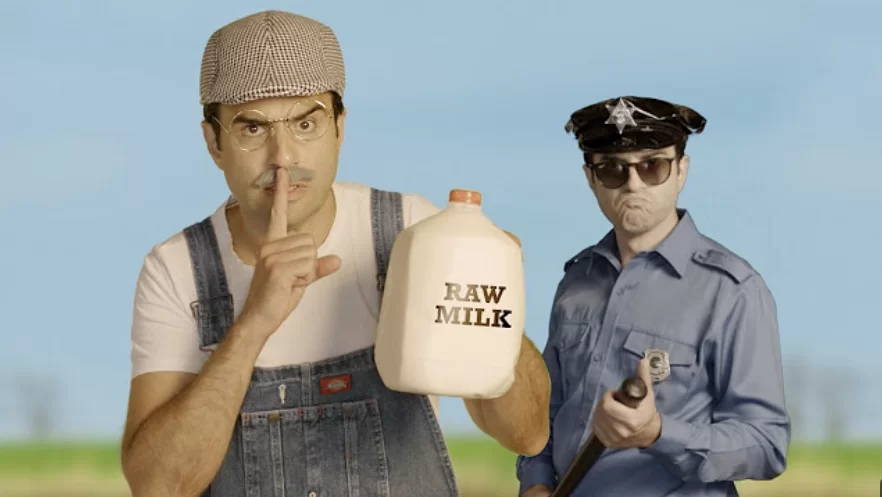Just walking into any old grocery store, Alabama citizens are unlikely to find unpasteurized milk on the shelf next to the whole milk and the 2 percent reduced fat. But if they look hard enough, there’s plenty of this “raw milk” to be found—for “pet consumption only,” of course.
Under Alabama law it is illegal to sell raw milk for human consumption, but local farms can skirt that restriction by labeling the product as strictly for pets.
And there’s a market for it. “Alabama Raw Milk,” a private Facebook group started just a year ago by dairy farmer Kelly Porter, has 5.5 thousand members looking to buy or sell raw milk.
While health experts warn that unpasteurized milk opens up consumers to the risk of numerous pathogens, raw milk supporters argue that foregoing the pasteurization process preserves a number of health benefits to milk including improvements for gut health, asthma, allergies and even allowing people who are lactose intolerant to enjoy milk without issue.
Those supporters feel the political winds may be changing in their favor as President-elect Donald Trump has named Robert F. Kennedy Jr. as his preferred leader of the Department of Health and Human Services. Kennedy has mentioned that he only drinks raw milk and in a post to X on Oct. 25 said that “The FDA’s war on public health is about to end. This includes its aggressive suppression of … raw milk.”
So far, 14 states have made retail sales of raw milk legal, mostly western states. Another 19 states, including neighbor states Mississippi and Georgia, have made some form of “on-farm sales” legal.
Alabama health officials told APR that they were not so keen to allow the sale of raw milk for human consumption, citing longstanding health concerns.
“I know there’s some talk about that with RFK and I think Rep. Thomas Massie, R-KY, being looked at for Secretary of Agriculture,” said Rick Pate, commissioner of the Alabama Department of Agriculture and Industry. “It’s not good science and not good health information. If I found anybody who worked for the department that did not take that seriously, there would be repercussions. We do take it serious.”
Pate’s department is technically over the sale of raw milk, since it is only allowed to be sold as pet food. Andy Tipton, another official in the Department of Agriculture, said there are a number of requirements for pet food labeling, including that it is not for human consumption.
“But you can’t stop people from eating dog food,” Tipton said, adding that raw milk sellers likely won’t get into trouble “if it’s labeled correctly—as long as they’re not saying something opposite to the consumer.”
Raw milk bootleggers?
When it comes to the sale of raw milk, there’s a wink-and-a-nod culture that makes it clear many people purchasing raw milk “for their pets” really mean to consume it themselves.
“We now have a few more openings for milk (for pet consumption only) 😉,” wrote one seller in the Alabama Raw Milk group.
“OMG I gotta have some!! For my pets of course 😝,” commented one person on a seller’s public Facebook post. The seller liked the comment.
Meanwhile, some posts point to the members’ desire to drink the milk themselves, including information being shared to the group claiming the benefits of drinking raw milk as opposed to pasteurized.
Ron Dawsey, director of Alabama’s Bureau of Environmental Services, said there is good reason raw milk is prohibited from being sold for human consumption in the state.
“Raw milk, that is unpasteurized milk, can contain some disease-causing pathogens,” Dawsey said. “This is not in Alabama, but elsewhere there have been some outbreaks of salmonella, e. coli and others.”
Raw milk made headlines this week after the H5N1 bird flu was found in a batch of raw milk in California, prompting a recall. Unlike some of the other pathogens that would primarily affect the direct consumer, bird flu could be spread from person to person after the initial transfer via the milk consumption.
Raw milk supporters say that even if there are risks to drinking unpasteurized milk, the government should not prevent them from buying it; after all, restaurants are allowed to serve raw oysters despite the CDC estimating that 80,000 people contract vibriosis annually with about 100 people dying from the illness.
“For me it should never be about the laws,” Porter told APR. “If as an individual, if I want to go and buy raw milk or fresh pork or beef from a farmer and I am good with how they do things, it shouldn’t be between anyone else—just them and myself.”
Raw milk supporters back alternate research
Beyond that, supporters also generally don’t believe raw milk is as dangerous as health officials treat it to be and, in fact, tout all manner of potential benefits.
Supporters point to the Raw Milk Institute as the prime source of research information that supports their belief that unpasteurized milk properly prepared is generally safe for human consumption and has health benefits that can’t be found in pasteurized milk.
The FDA, meanwhile, has its own page dedicated to “raw milk misconceptions and the danger of raw milk consumption.” This page flatly denounces many of the claims made by raw milk enthusiasts. The page states that “raw milk does not cure lactose intolerance … does not cure or treat asthma and allergy … is not more effective in preventing osteoporosis than pasteurized milk … [has] no beneficial bacteria for gastrointestinal health … is not an immune system building food and is particularly unsafe for children … is not nutritionally superior…” and so on. Each of these points is fleshed out on the FDA page with reference to studies.
There were numerous members of the Alabama Raw Milk group who would beg to differ, telling APR of their anecdotal experiences with drinking raw milk.
“I can tell you that I had severe stomach issues and was hospitalized twice in the VA hospital,” said JD Duke. “I had increased Eosinophils in my blood, stomach, colon and esophagus. I was horribly sick and drinking raw milk eased it and ultimately got rid of it. I have no clue how but when I would have a flare up, drinking the milk eased it and if I had a flare up and didn’t drink the milk, it came roaring back.”
Duke said “it feels like a drug deal” when he goes to make his weekly raw milk pickup “because of the ridiculous laws regarding raw milk.”
“I’m amazed that in a culture that has normalized eating ultra processed food that is horrific for you that raw milk is demonized,” Duke said.
Emily Sargent said her family is lactose intolerant, but has found that they can drink raw milk.
“Unfortunately pasteurized milk causes bloating and pain,” Sargent said. “We discovered this while traveling in the Midwest when we visited a local farm and have been drinking raw milk since! I’m grateful for that experience and hope upcoming HHS changes will result in raw milk being readily available! I believe most people would agree current laws are an example of government overreach.”
Comments flooded in on APR’s simple question Tuesday: what benefits do you feel you have experienced from drinking raw milk? APR agreed to grant anonymity to commenters unless they opted in to being identified for this article, although consuming raw milk is not illegal.
People reported all kinds of benefits from drinking raw milk: one person said it halted her daughter’s cavity problems; people reported that raw milk helped skin clear up; one commenter said it helped cure her grandfather’s ulcer. There was also fear about a journalist’s presence in the group and whether it might bring increased scrutiny on the community.
Creating a raw milk community
Before the Covid-19 pandemic, Porter had never even tasted raw milk. The woman who now oversees the sprawling Facebook community bought her first cow as a response to the pandemic.
“People forget this, but they were limiting the amount of milk you could buy as a family,” Porter said. “They were only allowing one gallon per family. I said ‘My grandbabies have got to have milk’ so we got a cow.”
Porter now has eight cows and only sells raw milk, only for pet consumption. She does not sell pasteurized milk. She said the important thing is for people to do their “due diligence” if they are going to decide for themselves whether to drink raw milk.
The community that has come together to support drinking raw milk personally feels almost like a “secret society,” Porter said.
In the course of growing her business of selling raw milk, Porter has learned a lot about the process. There’s a lot that goes into ensuring raw milk is safe since it does not go through the pasteurization process that works as a catch-all for disease.
“I have all of my cows tested for any bovine disease, and also have them tested to make sure their milk is ‘A2/A2’ before they come on my farm to make sure I’m drinking the best quality milk I can possibly drink,” Porter said. “We milk it, freeze it, pack it on dry ice and have it shipped for testing in a Wisconsin lab. They test it for a wide variety of everything.”
“A2/A2” is common terminology among the raw milk community, referring to the casein protein found in milk. There are two proteins present, casein and whey. There are two types of beta-casein: A1 and A2. A2/A2 milk is milk that has only the A2 beta-caseins in it, which raw milk supporters say is more akin to human milk and better for digestion.
In addition to the European studies and other research cited by raw milk supporters, Porter said raw milk can also have religious significance, citing Muslim friends who pointed to scripture in the Quran identifying “pure milk” as having healing properties. Of course, pasteurization came long after the writing of the Quran.
Should Alabama legalize some form of raw milk sales for human consumption?
While it would seem obvious that supporters of raw milk would like to be able to openly purchase raw milk without having to pretend it is for their pets, the potential regulations that could come with legalization give producers pause.
“I wish it wasn’t so demonized, but I’m not sure we could afford to jump through all the hoops that they would instill upon us,” Porter said.
Raw milk is already significantly more expensive than pasteurized milk found on most any store shelf.
The current rate for a Great Value gallon of milk at Walmart on Wednesday was $3.20. Of course, that’s on the low end and is benefited by the nature of Walmart’s corporate reach, but the national average cost of a gallon of milk is estimated to be about $4.
The going rate for a gallon of raw pet milk is anywhere between $10 to $24, Porter said, a steep price for pet milk.
“For me, it’s a health thing because I know all the benefits it has for my body,” Porter said. “I make homemade butter with it that is so sweet and creamy, it’s everything.”
As for why the milk is so expensive, Porter said that’s “just the market.”
Is raw milk safe for children?
While a major argument of individuals who support raw milk is that the government should not interfere with a citizen’s decision over what food product to buy, the matter is complicated when it involves children.
Not only do children not have the same agency to make those health decisions for themselves, health experts warn that children under 5 years old in particular could be at greater risk of the pathogens that raw milk may carry.
“The immune system of children under 5 years old is still developing, which outs them at greater risk,” said Troy pediatrician Elizabeth Dawson, who serves as secretary and treasurer of the Alabama chapter of the American Academy of Pediatricians.
The AAP warns about the potential health risks to children as well as to pregnant women and their children in utero.
“Raw milk and milk products from cows, goats, and sheep continue to be a source of bacterial infections attributable to a number of virulent pathogens, including Listeria monocytogenes, Campylobacter jejuni, Salmonella species, Brucella species, and Escherichia coli O157,” the AAP states in its official policy statement on raw milk. “These infections can occur in both healthy and immunocompromised individuals, including older adults, infants, young children, and pregnant women and their unborn fetuses, in whom life-threatening infections and fetal miscarriage can occur.
“Efforts to limit the sale of raw milk products have met with opposition from those who are proponents of the purported health benefits of consuming raw milk products, which contain natural or unprocessed factors not inactivated by pasteurization. However, the benefits of these natural factors have not been clearly demonstrated in evidence-based studies and, therefore, do not outweigh the risks of raw milk consumption. Substantial data suggest that pasteurized milk confers equivalent health benefits compared with raw milk, without the additional risk of bacterial infections.”
Many supporters of raw milk stand by their studies though and their assertion that parents should be able to do their own research and decide whether raw milk is suitable for themselves as well as their families.













































